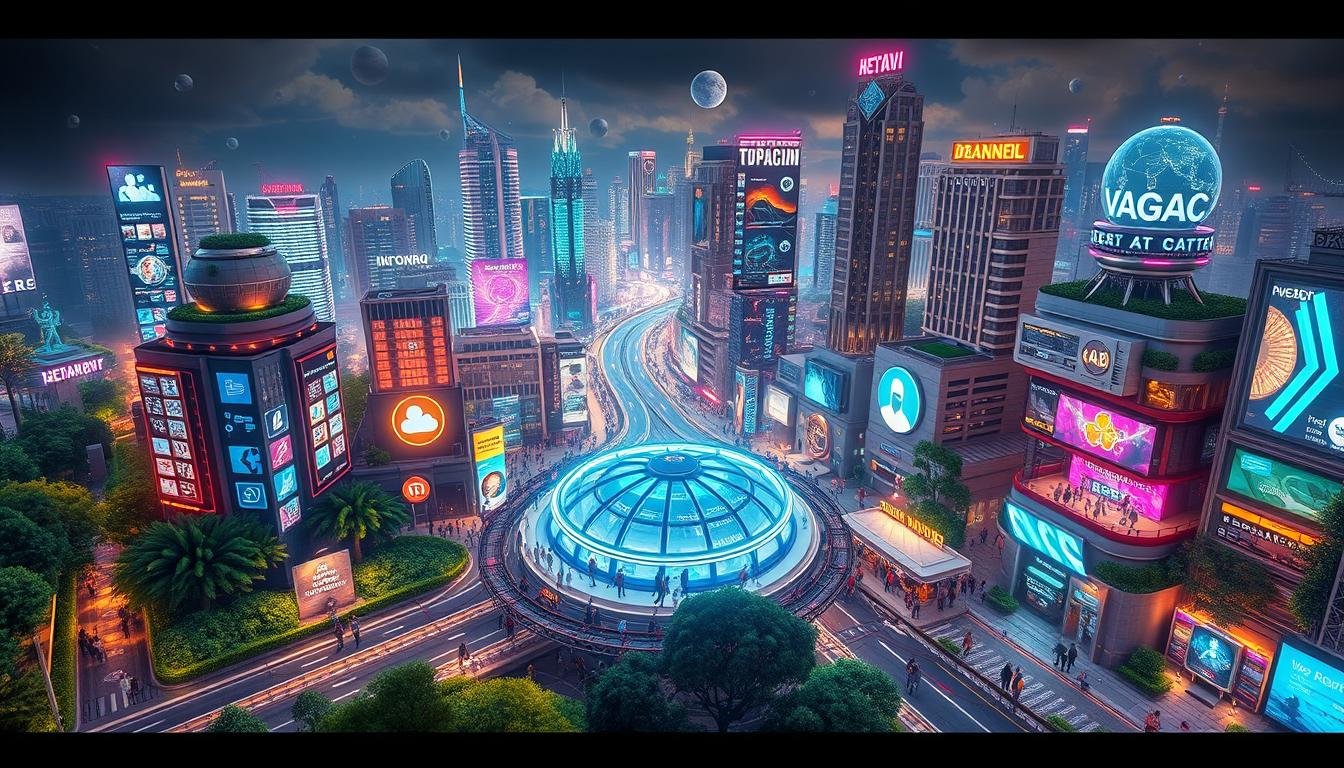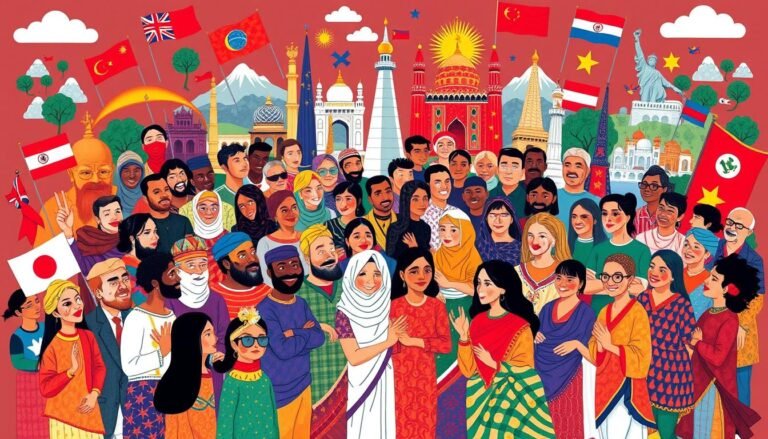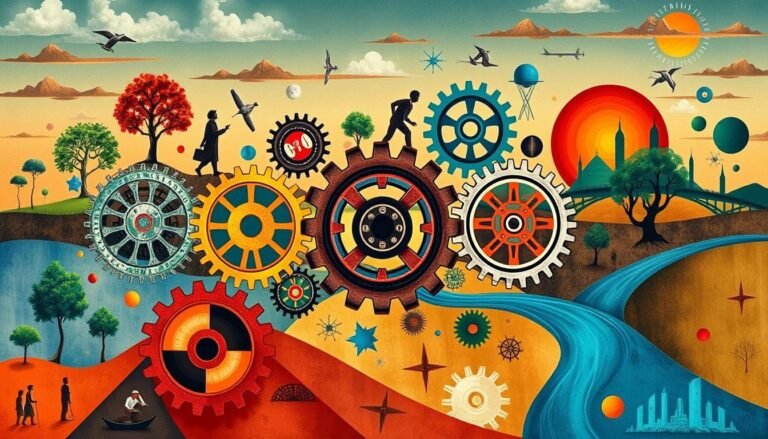The Role of Technology in Social Change
Technology is now a key player in changing our world. From ancient tools to today’s smartphones, tech has always changed society. Now, we’re asking: Are we in charge of this digital change, or is it controlling us?
Technology has a big impact on social change. It changes how we talk, work, and think. Social media helps activists and fundraisers, and online classes open new career doors. But, there are also issues like privacy and a tech gap between people.
We’ll look into how tech changes more than just our devices; it changes our social lives and relationships. We’ll see how tech has driven social change from the past to now. And we’ll think about how new tech might change us in the future.
Key Takeaways
- Technology has been a driving force in social change throughout history
- The digital era has accelerated the pace of societal transformations
- Social media and online platforms are reshaping activism and fundraising
- Technological innovations bring both opportunities and challenges to society
- The relationship between technology and social change is complex and multifaceted
Understanding Social Change in the Digital Era
The digital era has brought about a new era of social change. It has changed how we talk, work, and connect with others. This change is all thanks to digital transformation.
Defining Social Change in the Context of Technology
Social change today means changes in social norms, cultural values, and how we act. Online communities have made it easier to connect with people far away. This has made the world feel smaller.
The Accelerating Pace of Technological Advancements
Technology is moving at an incredible speed. In just 28 years, from 1986 to 2014, internet connections grew a lot in 172 countries. This has led to a huge increase in how we share and use information.
How Technology Impacts Social Structures and Relationships
Technology is changing our social lives. Internet activism has become a strong tool for change. It helps small movements spread their message fast. Even online dating has changed how happy marriages are, showing tech’s effect on our personal lives.
| Aspect | Impact |
|---|---|
| Communication | Global instant messaging |
| Activism | Rise of internet-based movements |
| Relationships | Online dating influencing marital outcomes |
| Work | Remote work and digital marketplaces |
As we move through this digital world, we must think about both the good and bad sides of these changes. The digital divide is still a problem. It shows we need to make sure everyone can join in this new digital world.
Historical Perspective: Technology as a Catalyst for Social Evolution
Technology has always pushed society forward. From the Stone Age to today, each new tech has changed how we live. The Industrial Revolution was a big change, moving us from farming to city life.
The steam engine changed everything in the Industrial Revolution. James Watt made it better in 1768, making it powerful enough for factories. This led to fast growth and new city life, changing our social ways.
Then came the digital revolution with personal computers in the 1980s. The internet in the late 20th century made information easy to get and started big online stores like Amazon. Mobile phones in the 2000s changed how we talk and do business.
“The growth during the Industrial Revolution resulted in an unprecedented rise in the world’s population and improved living standards for many.”
Now, artificial intelligence and automation are changing jobs and industries. While some worry about losing jobs, new areas like AI ethics are creating new work. Social media has changed how we talk and join together in politics, showing tech’s big role in society.
| Era | Key Innovation | Social Impact |
|---|---|---|
| Industrial Revolution | Steam Engine | Urbanization, Mass Production |
| Digital Revolution | Personal Computers | Information Access, E-commerce |
| Mobile Era | Smartphones | Always-on Communication, App Economy |
| AI Era | Machine Learning | Job Market Shifts, Ethical Challenges |
The Digital Revolution and Its Impact on Society
The digital revolution has changed our world, connecting people everywhere and changing how we talk, work, and live. It has brought both good and bad changes, deeply affecting society.
The Rise of the Internet and Global Connectivity
The internet started in the 1970s and changed history. Now, it links nearly half of the world, letting us talk in real time across the globe. This has grown online communities and sparked new kinds of activism online.
About 50% of the developing world got digital tech in just 20 years. This shows how fast things have changed.
Social Media’s Influence on Communication
Social media has changed how we talk and share info. It connects people but also worries us about privacy and mental health. It affects how we see ourselves and compare to others.
These platforms are also where activism goes viral, helping movements spread fast.
The Smartphone Revolution and Mobile Technology
Smartphones have made tech a big part of our lives, changing work, social life, and how we find info. They’ve led to new jobs through apps like Uber and Airbnb. But, this shift has also made us worry more about online safety.
With more people using mobile devices, our personal info is at risk of being hacked.
“The United Nations Secretary-General has highlighted concerns about geopolitical tensions causing a potential fracture in digital cooperation and the establishment of a digital Berlin Wall.”
We need to tackle the problems tech brings while using it for good social change.
The Role of Technology in Social Change
Technology has changed society in big ways over time. From the Industrial Revolution to today, it has made economies grow and life better. The early 1900s saw big changes with factories and the rise of companies like Ford and General Motors.
Recently, Silicon Valley has led in making new tech like semiconductors, personal computers, and the internet. These changes have changed how we handle information, making new kinds of creative work possible. Now, tech is also helping with charity, making it easier to give to those in need.
Automation has changed jobs a lot, affecting work around the world. Companies like Uber and Airbnb have changed old business models. They challenge old rules but also make us think about privacy and bias.
“Technology has been a driver for economic growth and sustains prosperity, fueling innovation and improving living standards.”
But, technology also brings problems. People spending more time online can lead to feeling lonely. And, while it helps us learn about the environment, it also makes us aware of big environmental issues.
As we move forward with technology, we need to keep finding a balance. We must think about how to keep the internet open and safe for everyone. This way, we can keep making new things and keep our global markets strong.
Technological Innovations Driving Economic Shifts
The digital economy is changing our world in big ways. Automation and digital marketplaces are leading this change. They’re altering how we work, earn, and spend.
Automation and the Changing Job Market
Automation is changing the job world a lot. It’s taking away some jobs but making new ones. This change is hitting low to middle-skill jobs the hardest, making us look for higher skills.
This shift is affecting wages and job numbers at the lower end. Workers are moving to higher-level skills.
The Gig Economy and Digital Marketplaces
Digital marketplaces are growing the gig economy. They’re changing how we work, offering more flexibility but also new challenges. Workers now have more varied work setups, which is making social protection systems adapt.
Cryptocurrency and the Future of Finance
Cryptocurrencies are challenging old financial systems. They’re part of a trend that’s moving income from work to wealth. This change is making wages more unequal and changing who has economic power.
| Economic Indicator | Impact of Technological Innovation |
|---|---|
| Productivity Growth | Slowed in many economies, strong only in firms at the technological frontier |
| Income Inequality | Increased, particularly in advanced economies |
| Skills Gap | Widening, with higher-level capabilities needed for success |
| Investment | Weak in most major economies despite low interest rates |
These tech changes are causing big economic shifts. They’re changing how income is spread, job security, and what work means. As we move through this new world, we need to make sure everyone benefits from these changes.
Technology’s Influence on Political Movements and Activism
The digital age has changed how we fight for our rights and beliefs. Now, people can join causes and share their views worldwide thanks to the internet. Social media is key in spreading the word and getting people to support different issues.
Social media has really changed how we get involved in politics. In the 2008 U.S. presidential election, Barack Obama’s team used digital tools very effectively. They sent almost 1 billion emails, got 2.5 million Facebook friends, and over 115,000 Twitter followers. This online strategy helped them raise $750 million for his campaign.
Internet activism has been vital in global movements too. The Arab Spring showed how social media helps people organize and share news. Activists could plan protests and update each other in real-time, avoiding traditional media.
“Technology continues to serve as a battleground between civic movements and governments, with ongoing iterations and advancements shaping the fight for political freedoms.”
But, internet activism isn’t all good news. Governments are fighting back with digital tools of their own. They use surveillance, block websites, try to control social media, shut down the internet, and target online users. China is leading in these digital control methods, worrying others about their spread.
As technology gets better, so does activism. Social media keeps growing as a way to make people aware and support causes. The battle between activists and governments shows how technology can both help and hinder political change.
The Double-Edged Sword: Benefits and Challenges of Technological Progress
Technology has changed our world in big ways. It brings both great chances and big challenges. Understanding how these changes affect us is key.
Improved Access to Information and Education
The internet has changed how we learn. Now, we can find lots of knowledge, learn new things, and even start businesses from home. This has opened doors for millions around the world.
Privacy Concerns and Data Security Issues
As we live more online, keeping our data safe is a big worry. The use of AI and big data means more data is being collected. This raises questions about our privacy and the ethics of tech. Finding a balance between new tech and keeping our data safe is a major challenge.
The Digital Divide and Technological Inequalities
Technology has brought us closer, but it has also made some gaps wider. The digital divide means some people can’t get to the tech they need. This affects their education, job chances, and life quality.
| Technology Impact | Positive Effects | Challenges |
|---|---|---|
| Communication | Global connectivity, real-time interaction | Privacy issues, cyberbullying |
| Education | Access to information, online learning | Digital divide, unequal access |
| Job Market | Remote work, new tech roles | Job displacement, skill gaps |
We must tackle these challenges as we move forward with technology. Making tech development ethical is crucial. This way, everyone can share in the good things tech brings.
Emerging Technologies and Their Potential Social Impacts
Our world is changing fast thanks to new tech. Things like artificial intelligence and biotechnology are changing how we live and work. The Internet of Things is making homes smarter and helping us save energy. Augmented and virtual reality are becoming more real.
Blockchain technology is also growing, used in finance, healthcare, and more. This shows how important ethical tech development is now.
New tech like 5G networks and quantum computing will bring big changes. We’ll see things like self-driving cars and smart cities. Robots are being made to think and act like us, changing jobs in construction and transport.
But, these new techs also bring challenges:
- Privacy and data security concerns
- Job displacement due to automation
- Potential bias in AI algorithms
- Exacerbation of social inequalities
To make the most of these new techs, we need to think about ethics. This way, we can make companies stronger, keep customers loyal, and engage employees better. By making sure everyone can use these techs, we make sure they help everyone, not just a few.
Ethical Considerations in Technological Development
The rapid growth of technology brings ethical challenges to the forefront. As we navigate this complex landscape, ethical tech development becomes crucial. Tech companies play a significant role in shaping societal norms, making their decisions vital for our future.
AI and Machine Learning: Ethical Implications
Artificial Intelligence and machine learning raise concerns about privacy and bias. A recent study shows that 78% of people worry about potential bias in AI algorithms affecting their privacy. This highlights the need for transparent guidelines in AI development.
Balancing Innovation with Social Responsibility
Tech companies face the challenge of driving innovation while maintaining social responsibility. The concept of responsible learning, introduced by Bouchaut and Asveld, suggests controlled experiments to explore potential risks step-by-step. This approach allows for regulatory flexibility and ethical tech development.
Tech Companies Shaping Societal Norms
Tech-driven philanthropy is on the rise as companies recognize their influence on society. 65% of consumers prefer products from companies demonstrating ethical design practices. This trend encourages tech firms to prioritize responsible decision-making in their operations.
“Technology is reshaping the landscape for 2024, emphasizing a more human-centered design approach.”
As we move forward, balancing innovation with ethics remains crucial. The tech industry’s focus on sustainability and collaborative efforts with nonprofits and academia shows promise for responsible technological advancement.
Conclusion: Navigating the Future of Technology-Driven Social Change
The digital world is changing fast. Today, 66% of people worldwide use the internet. This shows how big an impact technology has on our lives. It changes how we work, connect, and live.
These changes have good and bad sides. Cyberbullying and online scams show we need to learn more about staying safe online. As technology gets smarter, jobs are changing too. For example, Amazon uses 15,000 robots in warehouses.
People have different views on what the future holds. Some see a bright future, others worry about challenges. But one thing is sure: we must adapt to these changes. We need to balance new tech with ethics and fix digital gaps to make a better future for everyone.
Source Links
- Technology and Social Change – Essay by EduBirdie
- how-to-use-technology-to-promote-social-change
- Impact of Technology on Society – GeeksforGeeks
- Digital technology and social change: the digital transformation of society from a historical perspective
- Societal Change in the Digital Age
- The Evolution of Education and Technology as a Primer and Catalyst for Innovation in the 21st Century
- The Evolution of Technology and Its Impact on Business
- The Industrial Revolution and STS
- The Digital Revolution: Technology’s Impact on Society
- The Impact of Digital Technologies | United Nations
- The Role of Technology and Innovation in Shaping Democratic Capitalist Economies
- Digital Technology and Social Change
- How digital transformation is driving economic change
- Technology and the future of growth: Challenges of change
- Digital Technology’s Evolving Role in Politics, Protest and Repression
- How Does Technology Impact Politics?
- Social Change, Technology, and Modernization
- The Double-Edged Sword: The Transformative Impact of Technology on Society
- Technology is a double-edged sword.
- The Role Of Technology In The Future And Its Impact On Society
- The Intersection of Technology and Society: Ethical and Social Implications of Emerging Technologies | BairesDev
- Ethical, Legal and Social Implications of Emerging Technology (ELSIET) Symposium
- Technology and Ethics
- Bridging The Digital Gap: Tech’s Role In Social Responsibility
- How Has Technology Affected Social Interaction? – Sogolytics Blog
- Technological Progress and Potential Future Risks | OpenMind
- Experts Say the ‘New Normal’ in 2025 Will Be Far More Tech-Driven, Presenting More Big Challenges







